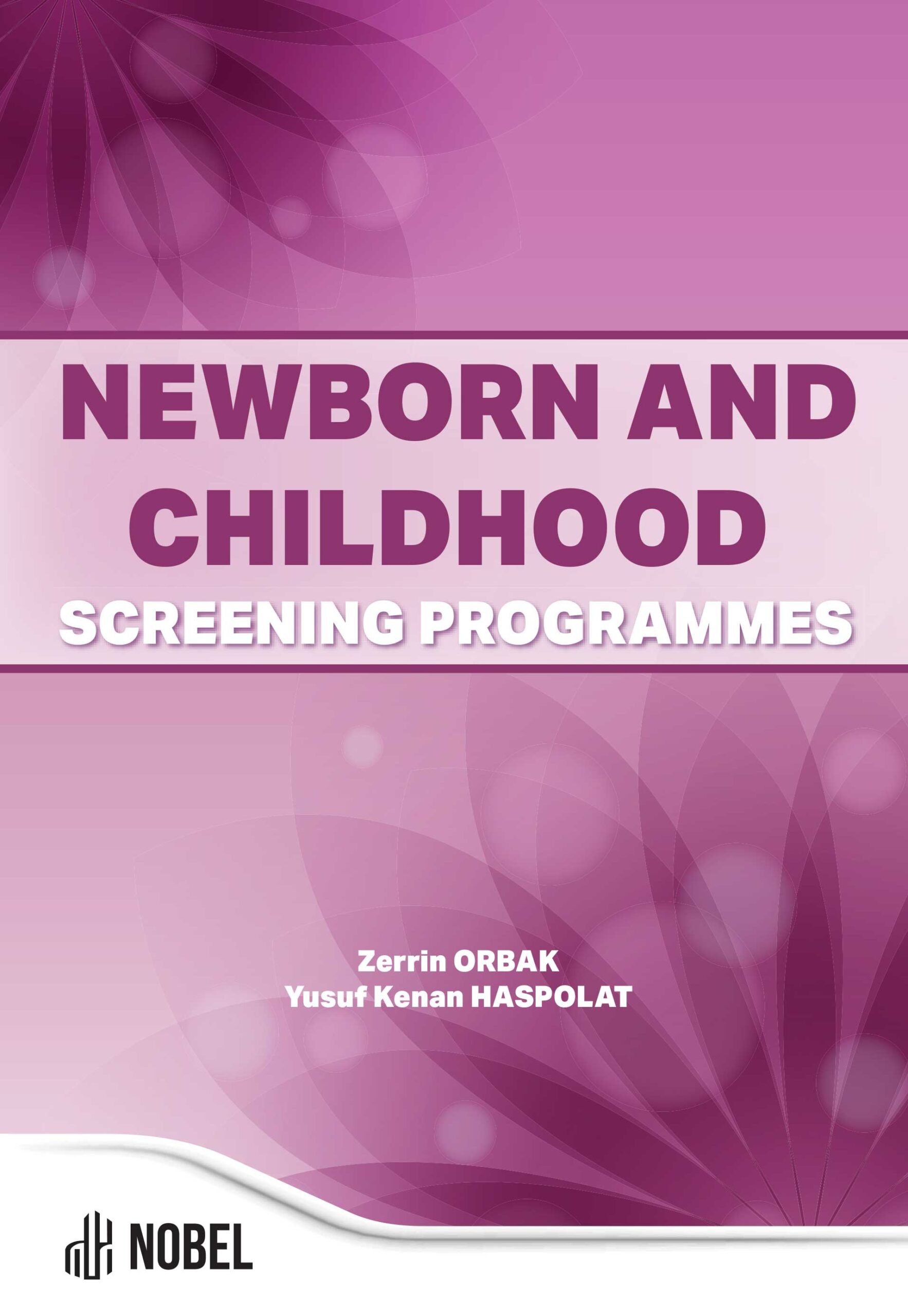Developmental and Behavioral Screening
Kezban Karabag (Author), Zerrin Orbak (Author)
Release Date: 2024-04-04
Developmental and behavioral screenings are crucial in pediatric care for the detection and intervention of developmental and behavioral issues in early years. American Academy of Pediatrics (AAP) offers guidelines for healthcare providers to screen and evaluate children, stressing the integration of developmental and behavioral surveillance into routine pediatric care. When screenings indicate potential risks, children [...]
Media Type
PDF
Buy from
Price may vary by retailers
| Work Type | Book Chapter |
|---|---|
| Published in | Newborn and Childhood Screening Programmes |
| First Page | 125 |
| Last Page | 137 |
| DOI | https://doi.org/10.69860/nobel.9786053358961.11 |
| ISBN | 978-605-335-896-1 (PDF) |
| Language | ENG |
| Page Count | 13 |
| Copyright Holder | Nobel Tıp Kitabevleri |
| License | https://nobelpub.com/publish-with-us/copyright-and-licensing |
Kezban Karabag (Author)
MD,, Erzurum Technical University
https://orcid.org/0000-0002-1303-159X
3Kezban Karabag, M.D., is a developmental pediatrician, pediatric health and disease specialist, with over ten years of professional experience. She has a strong academic background, having completed her education at Ankara University, School of Medicine, Department of Pediatrics, Developmental-Behavioral Pediatrics Division (2020-2024), Necmettin Erbakan University, School of Medicine, Department of Pediatrics, Child Neurology Division (2018-2020), Ataturk University, School of Medicine, Department of Pediatrics (2007-2011), and Gazi University School of Medicine (1999-2006). Throughout her career, she has published ten articles in peer-reviewed journals, presented over fifteen posters. Currently, she is affiliated with the Department of Developmental Pediatrics, Erzurum City Hospital, Erzurum, Turkey.
Zerrin Orbak (Author)
Prof. Dr., Ataturk University
https://orcid.org/0000-0002-1847-9844
3After completing Atatürk University Faculty of Medicine in 1989, she started his specialty training at Atatürk University Faculty of Medicine, Department of Child Health and Diseases in the same year. She was appointed as an assistant professor to the same faculty in 1994. She completed his subspecialty training in the Department of Endocrinology and Metabolism at Ege University, Department of Pediatrics, between 1996 and 1998. She became an associate professor in 1998. In 1999, She took part in the establishment of the Pediatric Endocrinology and Metabolism Department within the Department of Pediatrics of Atatürk University Faculty of Medicine. Between August and December 2003, she served as an observing professor at the Ohio State University Children’s Hospital Department of Pediatric Endocrinology. She became a professor in March 2004. Between 2006 and 2008, she served as vice dean, purchasing commission chairman and pharmaceutical research ethics committee chairman. She has been the Head of the Department of Pediatric Endocrinology and Metabolism since 1999 and the Head of the Department of Pediatrics since 2017, and the Deputy Chief Physician since 2023. She is a member of ESPE (European Society of Pediatric Endocrinology), Endocrine Society and ISPAD (International Society for Pediatric and Adolescent Diabetes), Pediatric Endocrine and Diabetes Association, and Turkish National Pediatric Association. She worked as a manager and researcher in national multi-center projects, BAP and TÜBİTAK supported projects. She has over 150 international scientific studies, and presented at numerous national and international conferences. She has also supervised many postgraguate theses. She is currently the editor of the ""internal medicine"" section of ""The Eurasian Journal of Medicine"". The journal is included in the SCI-Expanded database.
Brewer, E. J., Jr, McPherson, M., Magrab, P. R., & Hutchins, V. L. (1989). Family-centered, community-based, coordinated care for children with special health care needs. Pediatrics, 83(6), 1055–1060
Ertem, I. O., & World Health Organization. (2012). Developmental difficulties in early childhood: prevention, early identification, assessment and intervention in low-and middle-income countries: a review.
Ertem, I. O. (2017). The international guide for monitoring child development: enabling individualised interventions. Early Childhood Matters, 126, 83-7.
Galip, N., & Ertem, I. O. (2010). Adaptation of the guide for monitoring child development to the world health organisation international classification of functioning, disability and health-child and youth version and validity in chronically ill children. MD. Disability and Health-Child and Youth version and validity in chronically ill children. [Published Thesis, 266849, abstract in English] Ankara University
Hagan, J. F., Shaw, J. S., & Duncan, P. M. (2017). Bright futures: Guidelines for health supervision of infants, children, and adolescents: Pocket guide.
World Health Organization. (2018). Nurturing care for early childhood development: A framework for helping children survive and thrive to transform health and human potential. Geneva: World Health Organization. Retriewed from https://www.who.int/teams/maternal-newborn-child-adolescent-health-and-ageing/child-health/nurturing-care.
Tamburlini, G., & Ertem, I. (2019). Guide for monitoring child development. Medicoe Bambino, 38(2), 91-96.
WHO. (2001). International classification of functioning, disability and health: ICF. Geneva: World Health Organization. Retrieved from https://www.who.int/standards/classifications/international-classification-of-functioning-disability-and-health.
World Health Organization. (2020). Monitoring children’s development in the primary care services: moving from a focus on child deficits to family-centred participatory support: report of a virtual technical meeting, 9-10 June 2020. World Health Organization.
10.1542/peds.2017-4081.
| onix_3.0::thoth | Thoth ONIX 3.0 |
|---|---|
| onix_3.0::project_muse | Project MUSE ONIX 3.0 |
| onix_3.0::oapen | OAPEN ONIX 3.0 |
| onix_3.0::jstor | JSTOR ONIX 3.0 |
| onix_3.0::google_books | Google Books ONIX 3.0 |
| onix_3.0::overdrive | OverDrive ONIX 3.0 |
| onix_2.1::ebsco_host | EBSCO Host ONIX 2.1 |
| csv::thoth | Thoth CSV |
| json::thoth | Thoth JSON |
| kbart::oclc | OCLC KBART |
| bibtex::thoth | Thoth BibTeX |
| doideposit::crossref | CrossRef DOI deposit |
| onix_2.1::proquest_ebrary | ProQuest Ebrary ONIX 2.1 |
| marc21record::thoth | Thoth MARC 21 Record |
| marc21markup::thoth | Thoth MARC 21 Markup |
| marc21xml::thoth | Thoth MARC 21 XML |

